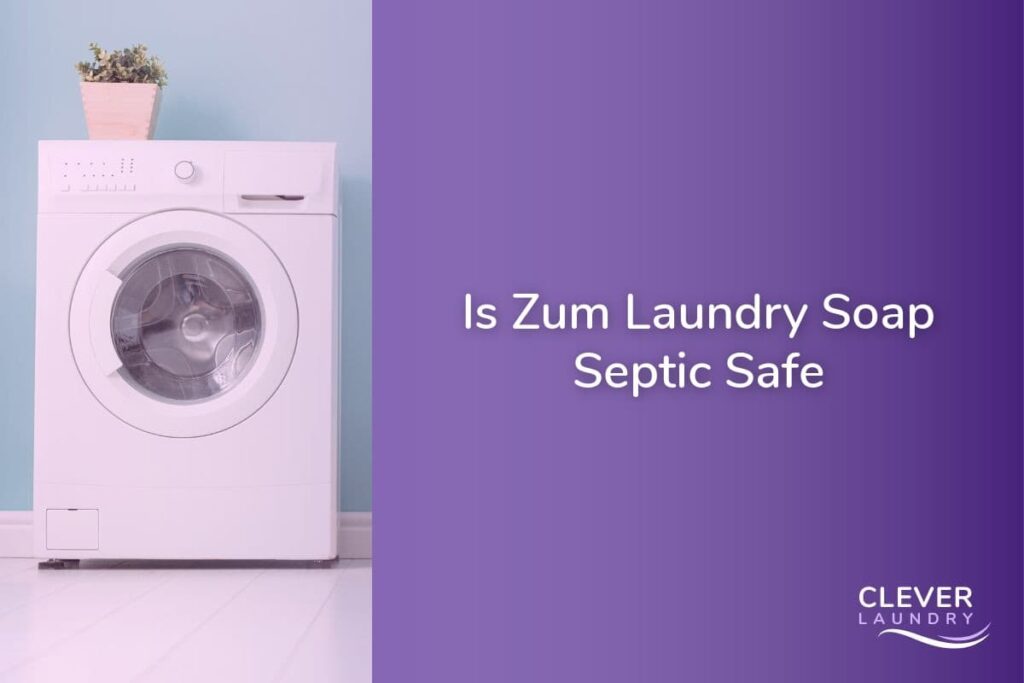When it comes to doing laundry, many people don’t think twice about the type of detergent they use. However, for those with septic systems, the choice of laundry detergent can have a significant impact on the system’s health and longevity. One popular brand, Zum Laundry Soap, has gained attention for its natural ingredients and eco-friendly claims. But is Zum Laundry Soap safe for septic systems?
Septic systems rely on a delicate balance of microorganisms to break down waste and keep the system functioning properly. Harsh chemicals, such as bleach and phosphates, can disrupt this balance and harm the system. Therefore, it’s important to choose a laundry detergent that is septic-safe and free from harmful chemicals. While Zum Laundry Soap contains all-natural ingredients and is marketed as environmentally friendly, it’s important to examine the product’s ingredients and determine whether it is truly safe for septic systems.
What is Zum Laundry Soap?
Zum Laundry Soap is a brand of laundry detergent that is marketed as being natural and safe for people and the environment. The company behind Zum Laundry Soap, Indigo Wild, was founded in 1996 and is based in Kansas City, Missouri. Zum Laundry Soap is one of several products that Indigo Wild produces, including soaps, lotions, and other personal care items.
Zum Laundry Soap is made from natural ingredients, including vegetable glycerin, coconut oil, and essential oils. The detergent is free from harsh chemicals, such as parabens, phthalates, and sulfates, that are commonly found in traditional laundry detergents. Zum Laundry Soap is also cruelty-free and vegan, making it a popular choice among consumers who are concerned about animal welfare.
Indigo Wild claims that Zum Laundry Soap is safe for septic systems, as it does not contain any ingredients that can harm the delicate balance of bacteria in a septic tank. However, it is important to note that not all natural laundry detergents are safe for septic systems, as some may contain ingredients that can clog or damage septic systems over time. It is always a good idea to check the label of a laundry detergent before using it in a septic system.
How Does a Septic System Work?
A septic system is a type of on-site wastewater treatment system commonly used in rural areas and homes that are not connected to a municipal sewer system. It is designed to treat and dispose of household wastewater and sewage by allowing it to naturally decompose in an underground tank and drain field.
The septic system consists of two main components: the septic tank and the drain field. The septic tank is a large, watertight container made of concrete, fiberglass, or plastic that is buried underground. It receives all the wastewater and sewage from the house, including water from sinks, toilets, washing machines, and showers. The tank is designed to hold the wastewater long enough for solids to settle to the bottom and for oils and grease to float to the top, leaving the liquid in the middle layer.
Once the wastewater is separated in the septic tank, the liquid layer, also known as effluent, flows out of the tank and into the drain field. The drain field, also known as a leach field or absorption field, is a network of perforated pipes or chambers buried in gravel trenches. The effluent is distributed evenly through the pipes or chambers and slowly seeps into the surrounding soil, where it is naturally filtered and treated by bacteria and other microorganisms.
It is important to note that a septic system requires regular maintenance to ensure proper operation and prevent costly repairs. Homeowners should have their septic tank inspected and pumped every three to five years, depending on the size of the tank and the number of people in the household. In addition, they should avoid flushing non-biodegradable materials, such as wipes, diapers, and feminine hygiene products, down the toilet, as these can clog the system and cause backups.
Is Zum Laundry Soap Safe for Septic Systems?
When it comes to choosing a laundry soap for septic systems, it is important to consider the ingredients and their effects on the septic tank. Zum laundry soap is a popular choice for those looking for a natural laundry detergent, but is it safe for septic systems? Let’s take a closer look.
Ingredients in Zum Laundry Soap
Zum laundry soap is made from natural ingredients such as coconut oil, baking soda, and essential oils. It does not contain harmful chemicals such as chlorine bleach, phosphates, or surfactants that can harm septic systems. However, it does contain essential oils which can be toxic to microorganisms that break down waste in the septic tank.
Effects of Zum Laundry Soap on Septic Systems
While Zum laundry soap is made from natural ingredients, it can still have an impact on septic systems. The essential oils in the soap can kill off the beneficial bacteria and enzymes that break down waste in the septic tank. This can lead to a decrease in the effectiveness of the septic system and potential backups or clogs.
It is important to note that the impact of Zum laundry soap on septic systems can vary depending on a number of factors such as the amount of soap used, the frequency of use, and the size of the septic tank.
Overall, while Zum laundry soap may be a natural and eco-friendly choice for laundry detergent, it may not be the best choice for septic systems. It is important to choose a septic-safe laundry detergent that does not contain harmful chemicals or ingredients that can harm the septic tank.

